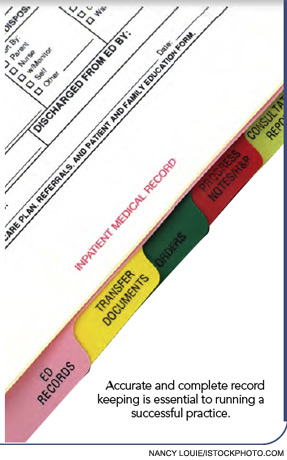Are your medical records up to date and complete? Medical records should always be complete and have accurate documentation to avoid violating the Health Insurance Portability and Accountability Act or other documentation guidelines.
Most states have specific statues that define the requirements for medical records, and these statutes are heavily enforced.
Here are a few key points to keep in mind for good record keeping:

- Dictate notes on procedures while they are fresh in your memory. Otherwise, you can be charged with failure to maintain adequate records and be fined heavily, depending on state laws.
- Never alter medical records. One of the worst errors you can make is to update or backdate an entry to any medical record. In the eyes of a court or medical review board, updated or backdated entries suggest a fraudulent attempt to alter the record and may be seen as trying to hide any negligence. Late entries are permissible if they accurately reflect the care that was given but not documented at the time. Date late entries with the current date and sign.
- Take your hospital record keeping seriously … they do. Complete records for services provided in hospital immediately even if the hospital is flexible on this point. Third-party payors will not pay without complete records.
- Informal professional services require formal records. Any time a service is provided, even for friends, neighbors, or employees, you must maintain proper medical records. This includes minor services such as writing a prescription or treating a cold or sore throat. This will protect you from any risk.
Every medical record should also contain a complete history, including a chief complaint; diagnoses and treatment plans; exam results; a physician signature and date on every page; a list of any drugs that are prescribed, dispensed, or administered; and reports of consultations, referrals, and hospitalizations.
Complete medical records improve the quality and efficiency of medical care and can lower costs.
If you need any assistance for coding and reimbursement, contact the ACR’s practice management department at (404) 633-3777, or join the ACR list serve, and post your question online at www.rheumatology.org/membership.

